
|
"It does not require many words to speak the truth."
-- Chief Joseph, Nez Pierce |
Working with horses in a FEEL™ session is sometimes the first time clients touch the freedom to tell the truth without the loss of love. This fact is so important to underscore: In the presence of horses is often the first time people feel free enough, to call forth their true feelings without fear of retribution. We have all experienced telling the truth and being punished for it. This universal experience has influenced and taught a whole culture of people to fear the truth. When we are afraid of something we usually will avoid it at all costs. It is costing us dearly to not live truthfully.
As a FEEL™ Facilitator, I feel this is the heart and practice of unconditional love - learning to tell the truth responsibly and not be threatened, judged, or lose love. With truth we become more real. Communicating the truth gives us the opportunity to fully heal. Living truthfully gives us a congruent life.
- How free are you to feel?
- How free are you to tell the full truth without fear of retribution?
- How responsible or effective are you with expressing your feelings?
- Have you ever taken part in any communication courses or training?
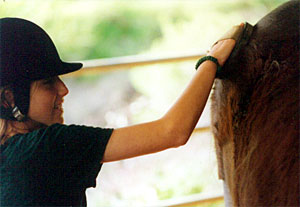 The impact on our human culture in not feeling free to express emotions without recrimination has taught us to override, so well for so long, we have lost the art of feeling, sensing and telling the truth. When we cannot tell the truth about what we authentically feel, author Angeles Arrien of The Four Fold Way suggests, "we begin to walk the procession of the living dead." There's great truth in this because a part of our spirit dies when we cannot access the truth of how we really feel or are able to voice those feelings.
The impact on our human culture in not feeling free to express emotions without recrimination has taught us to override, so well for so long, we have lost the art of feeling, sensing and telling the truth. When we cannot tell the truth about what we authentically feel, author Angeles Arrien of The Four Fold Way suggests, "we begin to walk the procession of the living dead." There's great truth in this because a part of our spirit dies when we cannot access the truth of how we really feel or are able to voice those feelings.
Horses are emotional trackers. They take us back to the places where we lost our way and headed into a detour of non-feeling. In their openness, they will often reveal to us what feels like untouched pain. Tears will flow without provocation. What gets dislodged in our hearts is often our unfinished emotional business. There is tremendous relief in this releasing. We often feel really, really seen and loved. The horses show us the brilliance of feeling what we were too afraid to feel, give time to, or openly express.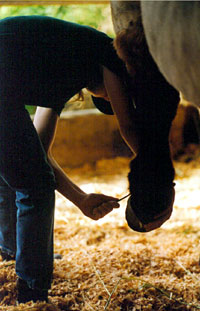
Another impact of not expressing emotions truthfully is that when we do start to release them it is often done irresponsibly and causes harm to our selves or others. This can scare us off from ever expressing them again.
A feeling of a bottomless pit often overwhelms people when they start to feel their feelings. We humans, have the task of learning how to slow down and to know our feelings one at a time. Within a FEEL™ session, one can find that space and time to slow down long enough to feel what most needs our attention. When we have not done this in a while, we are out of practice so to speak, or more accurately lack the skills, and training. Emotional strength training is essential for the fulfillment of our relationship's success.
If we continue this pattern of holding back our truer feelings how can we know our truer selves? How can others ever really know us? How can they know what we really want or need? And more importantly, how can others possibly give to us what we want and need if we have not taken the time to know our selves? In order to be heard with respect, it is necessary to learn how to tell the truth with respect. This requires of us to be honest with our selves first, then to know what are our emotional wants and needs. It requires that we learn conscious communication and listening skills.
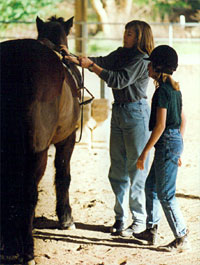 It takes great courage to dive deep into one's emotional nature. This is also essential responsibility work for being successful in the whole of life.
It takes great courage to dive deep into one's emotional nature. This is also essential responsibility work for being successful in the whole of life.
If we come to a person to clear up a misunderstanding and are met with that person getting angry with us, threatening to take their love away, or casting us out of the circle, we are not going to feel safe. We will fear being honest with that person. We'll often feel dominated by that anger. And, if we disappear or blow-up at a loved one when they try to express their feelings, we will push them away. If we experience this one too many times we will often avoid expressing our emotions. Yet this never works because to avoid our feelings does not make them go away. They end up lost, suspended outside time and space, waiting for us to pick them up where we left off. Or, they get lodged in some part of our bodies for a later time when we feel safe to deal with the pain. Unfortunately, most humans have collected far too many of these not dealt with, life experiences.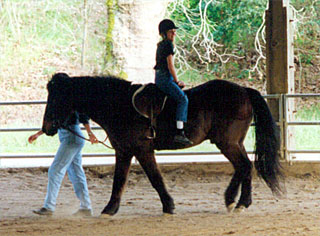
After leaving home, High School, or college, we are on our own to figure out how to responsibly communicate and relate to our emotional self. But without healthy modeling or education we cannot begin to know what are the effective ways of processing emotions. Not everyone is going to seek a therapist in his or her lifetime. Not everyone really needs that model. So where does a high functioning adult go to learn this emotional development?
The horses are calling us. They can teach us that feelings hold valuable information and can be taken as such. This ease of movement through emotional content becomes available as a new option while working with the horses. With that said, in our culture we have a huge chasm still to bridge between the practice of just feeling a feeling, getting the message they hold, and moving on. I have worked with emotional development and dark shadow work personally and professionally for over thirty years, and it is spiritual blackmail to think, we humans can forgo emotional processing altogether.
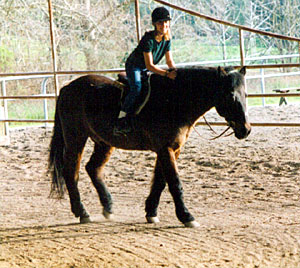 There are reasons we developed a survival-self in the first place. We cannot just throw it all away overnight. It takes an emotionally creative effort on our parts to design our personal, relational and communal reality to support being openly expressive with emotions and telling the truth. Our society is not set up - yet, for total exposure. There are still too many people relying on aggression, passivity and passive-aggressiveness to get their needs met. Many have not taken the consciousness walk inside themselves to know what they want, need, or prefer. Many are under-communicating and even more are unclear how to communicate the language of the heart. Humans are multifaceted, intricate and often complicated beings. This work is not about being horses. However, we can become more horse-like.
There are reasons we developed a survival-self in the first place. We cannot just throw it all away overnight. It takes an emotionally creative effort on our parts to design our personal, relational and communal reality to support being openly expressive with emotions and telling the truth. Our society is not set up - yet, for total exposure. There are still too many people relying on aggression, passivity and passive-aggressiveness to get their needs met. Many have not taken the consciousness walk inside themselves to know what they want, need, or prefer. Many are under-communicating and even more are unclear how to communicate the language of the heart. Humans are multifaceted, intricate and often complicated beings. This work is not about being horses. However, we can become more horse-like.
It is important to say here, that being lost in one's pain, melodramatics, or caught up in a false interpretation of life is not what healthy emotional processing is either. Our pain will often mutate over time into an adapted self-expression, a worn-out story or misperceptions if left unattended. Learning how to effectively process our emotional content is an art and trainable set of skills.
Horses don't enjoy irresponsible ways of communicating feelings anymore than we do. They respond better when our communications are responsible, honest and usually calm. If there is emotional acting-out within a herd, the lead mare will put things straight to maintain the order. Many of us could have benefited from greater emotional leadership.
Horses will not judge or yell at you for what you feel, when you express your authentic feelings. They model a deep level of compassion and understanding for the pain one carries. They encourage us to let go of the pain. Emotions need tending. That tending is a listening without judgment. People judge so quickly because they do not have all the necessary information. But mostly they judge because they feel uncomfortable in the presence of your uncomfortable feelings.
So they want you to stop it, get over it, just drop it before it has been properly listened to, expressed or processed. We have to learn anew - the art and practice of expressing emotions responsibly - and sometimes fearlessly, until those who fear hearing the truth can catch up to us.
 Within our emotional nature is where so much richness of who we are is stored. And, the horses know when you are connected in your heart or if you are lost in your survival-self, mind. They will walk away from you or not come over in the first place. This is that brilliant in-the-moment reflection they provide. And, when you do land in your heart, then often you will have a horse's head in your chest, or one standing very closely, sighing in relief, as you spill the contents of your heart.
Within our emotional nature is where so much richness of who we are is stored. And, the horses know when you are connected in your heart or if you are lost in your survival-self, mind. They will walk away from you or not come over in the first place. This is that brilliant in-the-moment reflection they provide. And, when you do land in your heart, then often you will have a horse's head in your chest, or one standing very closely, sighing in relief, as you spill the contents of your heart.
Most of us, raised in our under-communicating, emotionally under-functioning families of origin, have not seen or experienced directly what a responsible and conscious feeling person really looks like. Witnessing and being in the presence of our primary caretaker's abilities or lack of abilities, as the case may be, is one of our primary methods for learning about life and love. Even high functioning adults struggle with this disparity of not learning how to effectively feel.
It takes great compassion on the part of yourself, the facilitator, and the horses to do the work of releasing denied emotional content and to learn how to re-wire your relationship with Feeling and then how to communicate those feelings, and further learn how to create your reality to accommodate a more open way of relating. Horses willingly step up to model this practice for those to experience, first hand in FEEL™ sessions.
This is deep work. It is consciousness work. There is a distinct difference between everyday conversation and "the language of the heart." This rich emotional work requires a large commitment to becoming an emotionally mature adult who is free to feel and not numb, avoid, deny or distract away their emotions. This commitment is the beginning to becoming more real and living authentically. Without this commitment we fall prey to the well-worn habits and patterns of emotional survival.
Part of who we are is the pain we carry. This is true. But our long-standing pain can act as a shield against our creativity, our intuitive wisdom, and our natural senses. Being reconnected to that powerfully creative energy brings a freedom of spirit and a peace of mind.
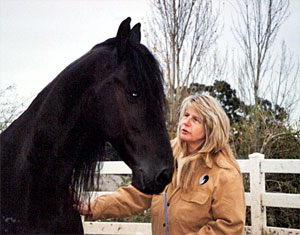 Working with horses can reconnect you to a profound relationship with love. What are your deepest loves? Are they not things like - nature; animals; beauty; creating; realizing dreams; safety and security; rest and play; clean air, food and water; respect and trust; freedom; choice; magic; honesty; learning; relationships; being blessed with work; inspiring others; mystery; giving back to society; receiving love; having a connection to All That Is; - are these not our most treasured life experiences?
Working with horses can reconnect you to a profound relationship with love. What are your deepest loves? Are they not things like - nature; animals; beauty; creating; realizing dreams; safety and security; rest and play; clean air, food and water; respect and trust; freedom; choice; magic; honesty; learning; relationships; being blessed with work; inspiring others; mystery; giving back to society; receiving love; having a connection to All That Is; - are these not our most treasured life experiences?
Look for a moment at what takes you away from what you truly love? Is it being too busy, anxiety, numbing-out, judgment, hopelessness, jealously, or rage? How about some of the tougher ones of - depression, loneliness, not belonging, the illusion of separation, feeling unlovable, unworthy or not enough? These are widely modeled in our culture. We have all been trained, that when we do not get what we want and need, to react, feel hurt, and then engage in some form of punishing behaviors.
Haven't you been on the receiving end of someone getting upset when you didn't give them what they want and they gave you the cold shoulder routine, were short or curt, making you wrong, publicly shaming, abandoning, refusing to work things out, or betraying, etc. Maybe you have done some of these things as well. We all have at one time or another. Yet, these behaviors pull us away from our hearts, away from love, and away from our authenticity. Horses provide a needed bridge from the distancing inauthentic to the connecting authentic.
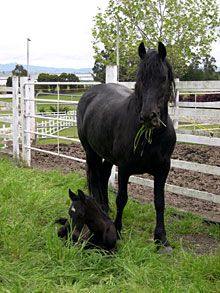 Horses are open, honest, available beings to what is felt among each member of the herd. They have no need to withhold love. They may not be able to trust another horse or person who is being unkind or unsafe, but that is being smart with good boundaries. With highly wounded horses, we have to earn their trust with only trustworthy behavior. Lying and being emotionally disconnected are not some of those behaviors.
Horses are open, honest, available beings to what is felt among each member of the herd. They have no need to withhold love. They may not be able to trust another horse or person who is being unkind or unsafe, but that is being smart with good boundaries. With highly wounded horses, we have to earn their trust with only trustworthy behavior. Lying and being emotionally disconnected are not some of those behaviors.
We can learn from our equine friends how to deal with and face our feelings over the more practiced behaviors of fleeing, fighting or freezing. I call these, The Four F's of Fear - Flight, Fight, Freeze or Face. We have another, more responsive choice - learning to face our fears. And in that facing, we can feel emotions as they arise, communicate our hurts responsibly, ask for what we want and need, inquire for greater understanding, initiate negotiation, and have compassion for our diversity.
As facilitators of this deep emotional work at HorseJourneys, we feel it is our responsibility to provide a safe environment for learning and experiencing deeply in order for our clients and students to open up. We cannot assume they have been taught how to deal with their emotions responsibly, so few people have. This is why we take great care in establishing a solid foundation in developing emotional strength and by providing the tools, practices and setting for emotional skills building and training for authentic living.
It is a life's work to clear the heart, especially if you have experienced a great deal of pain. John Wellwood, author of Journey to the Heart, invites us to be willing to love with "an open broken heart." Horses hold that safe space for humans to rediscover their open heart, even though it has been broken. Once our hearts are open, we can clear the blockages of the past. Then, we can begin to learn from horses how to lead with love. How to have what we say, do, think and feel come from love. Here, we begin to claim our authentic heart.
All materials and images protected ©Copyright HorseJourneys